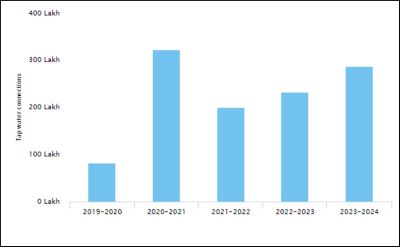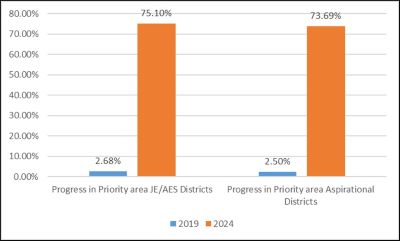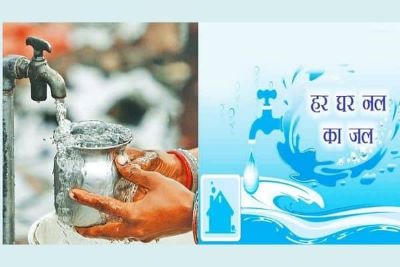Context-
India's Jal Jeevan Mission (JJM) has been instrumental in addressing the critical issue of water access, with the aim of achieving "Har Ghar Jal" (Water in Every Home). This initiative, launched by the Government of India in 2019, has made significant strides in providing safe and clean drinking water to rural households across the country. However, while remarkable progress has been achieved, the journey towards universal access to water is ongoing, underscoring the importance of understanding the social determinants of health in driving policy interventions.
Har Ghar Jal's Remarkable Success in India:
The Jal Jeevan Mission (JJM) has been a beacon of success in India's efforts to ensure universal access to safe drinking water. With a focus on individual household tap connections, the mission has made unprecedented progress, with millions of new tap connections being added each year. By early 2024, over 75% of rural households in India have benefited from tap water connections, marking a remarkable increase from just 16.69% in 2019. This success is unparalleled in India's social sector history, reflecting the government's commitment to addressing a fundamental social determinant of health.

Unsafe drinking water has long been a significant contributor to diarrheal diseases in India, causing a substantial number of preventable deaths annually. By providing access to safe drinking water, the JJM has the potential to avert thousands of deaths each year, highlighting the direct impact of water access on public health outcomes. Moreover, improved water access has broader societal implications, including positive effects on nutrition, education, women's empowerment, and economic opportunities. Therefore, the success of the JJM extends beyond health outcomes, contributing to overall socio-economic development.
Addressing Water Quality and Accessibility:
The Jal Jeevan Mission goes beyond the provision of tap connections, emphasizing the importance of water quality and accessibility. Decentralized governance and community participation are key components of the mission, recognizing that enduring change requires the active involvement of communities. Additionally, targeted financial allocations to states and strategic use of grants demonstrate a citizen-centric approach to addressing public health challenges. Efforts to establish comprehensive water quality monitoring and surveillance systems further underscore the mission's commitment to ensuring safe drinking water for all.
Water quality is particularly critical in marginalized communities, where access to safe drinking water has historically been limited. By prioritizing clean tap water in poorer districts and aspirational districts, the JJM aims to address health disparities and promote equity. The mission's success in increasing tap water connections in Japanese Encephalitis (JE) and Acute Encephalitis Syndrome (AES) affected districts and arsenic and fluoride-contaminated areas demonstrates its commitment to reaching the most vulnerable populations. Through targeted interventions, the JJM is not only improving health outcomes but also empowering communities and fostering inclusivity.
Reaching the Poorest and the Weakest
Aligned with Gandhi's talisman, the primary objective of public policy should be to meticulously assess the ramifications of every decision on the most impoverished and vulnerable individuals in society. This entails ensuring that each action not only positively impacts their lives but also empowers them, thus fostering a society where freedom and equity are accessible to all.
The Jal Jeevan Mission exemplifies Gandhi's talisman by embodying this principle in its endeavors. A significant stride towards inclusivity and health enhancement is evident in the Indian government's prioritization of providing clean tap water to households in relatively poorer districts afflicted by Japanese Encephalitis (JE) and Acute Encephalitis Syndrome (AES). As a part of the Jal Jeevan Mission, this initiative has witnessed a remarkable surge in tap water connections in 61 JE/AES-affected districts across five states, soaring from a mere 2.68 percent (8 lakh households) to an impressive 75.10 percent (2.23 crore households). This monumental increase has substantially improved the health profile of rural communities in these regions. Furthermore, by July 20, 2023, the mission successfully eradicated the risk of arsenic and fluoride contamination in drinking water, benefiting all affected habitations reported in 2019—14,020 for arsenic and 7,996 for fluoride—thereby ensuring safe drinking water for all within its purview.

Similarly, the Har Ghar Jal initiative has specifically targeted the 112 aspirational districts across the country, identified based on their socio-economic indicators as regions most in need of development and progress. By concentrating efforts in these areas, the initiative not only aims to elevate the quality of life through the provision of clean drinking water but also acts as a catalyst for socio-economic development. These districts spanning 27 states have witnessed a remarkable surge in tap water connections, from a mere 2.50 percent (5 lakh households) to 73.69 percent (1.5 crore households) (refer to Figure 2). Such focused attention on underserved areas resonates with the spirit of the Sustainable Development Goals (SDGs).
Conclusion
As India continues its journey towards achieving "Har Ghar Jal," the lessons learned from the Jal Jeevan Mission can serve as a model for other countries facing similar challenges. By adopting a holistic approach that emphasizes quality, accessibility, and sustainability, India has made significant progress in addressing a fundamental social determinant of health. The success of the JJM underscores the importance of interdisciplinary engagement and community participation in driving positive health outcomes. As the mission continues, it is essential to build on its successes and address any remaining challenges to ensure every household in India has access to safe and clean drinking water. Ultimately, "Har Ghar Jal" symbolizes the provision of water and the nurturing of life, health, and prosperity for all citizens.
|
Probable Questions for UPSC Mains Exam- 1. How has the Jal Jeevan Mission (JJM) in India exemplified the principles of Gandhi's talisman in its efforts to provide clean tap water to rural households, particularly in poorer districts? (10 Marks, 150 Words) 2. Discuss the significance of the Jal Jeevan Mission in addressing water quality and accessibility as social determinants of health in India. How has the mission contributed to improving health outcomes and promoting socio-economic development, especially in marginalized communities? (15 Marks, 250 Words) |
Source- ORF
























